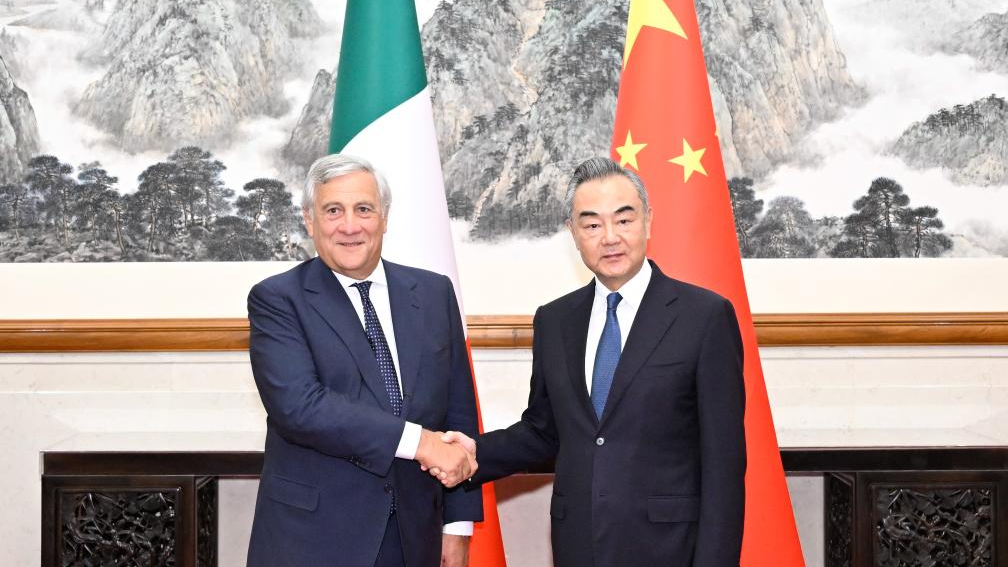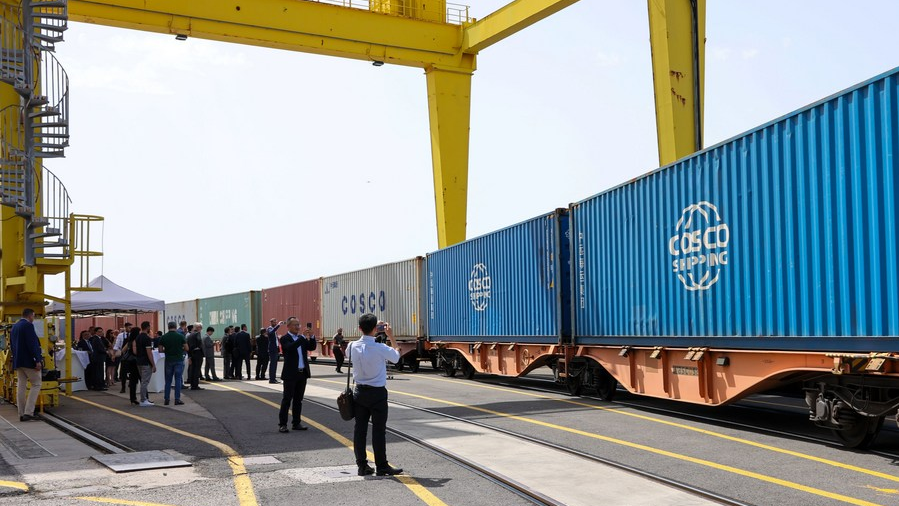
Chinese Foreign Minister Wang Yi, also a member of the Political Bureau of the Communist Party of China Central Committee, holds talks with Italian Vice-President of the Council of Ministers and Minister of Foreign Affairs and International Cooperation Antonio Tajani in Beijing, capital of China, September 4, 2023. /Xinhua
Chinese Foreign Minister Wang Yi, also a member of the Political Bureau of the Communist Party of China Central Committee, holds talks with Italian Vice-President of the Council of Ministers and Minister of Foreign Affairs and International Cooperation Antonio Tajani in Beijing, capital of China, September 4, 2023. /Xinhua
Editor's note: Kulsum Begum, a special commentator on current affairs for CGTN, is a security and strategic affairs researcher and freelance columnist. The article reflects the author's opinions and not necessarily the views of CGTN.
At the invitation of the Chinese Foreign Minister Wang Yi, also a member of the Political Bureau of the Communist Party of China Central Committee, Italian Vice-President of the Council of Ministers and Minister of Foreign Affairs and International Cooperation Antonio Tajani is paying an official visit to China and attending the 11th Joint Meeting of the China-Italy Government Committee.
The timing of Antonio Tajani's trip to China is crucial as adversarial forces try to sabotage bilateral economic and commercial relations. The sequence of exchanges between the two sides beginning with this visit will have some bearing on future bilateral economic relations.
Despite persistent Western claims that Italy is reluctant to extend a Belt and Road cooperation agreement, the visit to China by Tajani demonstrates that Italy expects to continue to gain from economic and commercial cooperation with China. China and Italy signed a Memorandum of Understanding (MoU) in March 2019 to work together to accelerate cooperation under the framework of the Belt and Road Initiative (BRI). Rome's 2019 agreement to the BRI sent shockwaves through the Western world. Italy is expected to make a decision regarding its continued involvement in the significant Chinese-led project in the upcoming months.
Bloomberg has reported that Italy is considering not renewing its Belt and Road cooperation pact with China, and the visiting Italian foreign minister may raise the matter with Beijing.
According to some Western media, the BRI did not produce the intended results. Tajani also stated that several Italian parties are opposed to Rome joining China's BRI.
But according to an Italian media outlet, during a meeting with the Chinese Foreign Minister Wang Yi, in February this year at Farnesina, Tajani noted with appreciation the 5 percent increase in exports seen in 2022 compared to the prior year and emphasized the significance of preserving a commercial balance with China, Italy's biggest trading partner in Asia, as well as helping Italian companies enter the Chinese market.
According to reports, Italian exports to China rose by 42 percent between 2019 and 2021, according to Jia Guide, the Chinese ambassador to Italy. China is Italy's biggest trading partner in Asia, and bilateral trade was close to $78 billion in 2022.
In addition, the 2022 China-Italy Year of Culture and Tourism was observed. Additionally, there are roughly 6,000 Italian students studying in China compared to about 29,000 Chinese students studying there.
Tajani said during a meeting with Liu Jianchao, head of the International Department of the Communist Party of China (CPC) Central Committee, in Rome in June that Italy is willing to act as a bridge between Europe and China and continue to play a positive role in EU-China relations.
It seems that Tajani's earlier comments are in conflict with these ones.
Basically, Italy's policy change is somewhat motivated by the right-wing orientation of the current administration, but it is more of a conundrum caused by increasing pressure from the U.S. and the EU against the backdrop of escalating geopolitical conflict. American anti-China hawks are active in Italy.
Following a meeting with U.S. President Joe Biden recently, Italian Prime Minister Giorgia Meloni declared that her country was still considering whether to extend the BRI deal and that she would soon be traveling to Beijing. Meloni had stated that the choice to remain or leave will be made by the end of December and that more discussion on the matter with the Chinese government and the Italian parliament was necessary.

Delegates attend the launch ceremony of a block train service for facilitating transportation of products from Chinese home appliances manufacturer Hisense, in Trieste, Italy, June 27, 2022. /Xinhua
Delegates attend the launch ceremony of a block train service for facilitating transportation of products from Chinese home appliances manufacturer Hisense, in Trieste, Italy, June 27, 2022. /Xinhua
Italy's choice to participate in China's Belt and Road Initiative (BRI) was "improvised and atrocious," according to Guido Crosetto, the defense minister of Italy. However, Michele Geraci, a former undersecretary of state at the Italian Ministry of Economic Development, disagreed with Crosetto's "inflammatory" comments, asserting that his nation will "gain even more benefits than we imagined" from renewing the pact.
The BRI is an easy target because of the West's bloc struggle with China, and this G7 and NATO member's acceptance of the MoU is increasingly perceived as a political leverage.
Italian interests are not the driving force behind the U.S.'s hostility to Sino-Italian cooperation under the Belt and Road framework; rather, it is geopolitics. The U.S. has recently adopted a hostile stance against China and has been employing language akin to the Cold War to keep China out of the international market. The U.S. has consistently viewed Italy's participation in the Belt and Road Initiative as a threat to its hegemony and is urging it to withdraw.
On the other hand, Italian businesspeople expressed their strong support for the renewal of the BRI cooperation agreement between China and Italy during their meeting with Liu. They also expressed their willingness to take advantage of the tremendous opportunities presented by the BRI's joint construction and to jointly promote mutually beneficial cooperation between the two nations to achieve even better results.
Italy should carefully weigh the advantages and disadvantages of remaining in or quitting the BRI while taking into consideration its own interests and its relationships with its European and transatlantic allies. Italy should seek a fair and productive discussion rather than acting alone or aggressively with China.
Italy needs to keep in mind that France and Germany expressed interest in cooperating with China. Even the U.S. Commerce Secretary Gina Raimondo recently returned from a trip to China aimed at boosting bilateral trade. Therefore, Italy cannot choose to disengage. Italy's balancing act may be appropriate for it.
Italy's stance on pragmatic collaboration with China shouldn't be changed. Italy shouldn't choose to stigmatize the commercial partnership by ignoring the realities. Instead of administering a third party's interest, Italy should administer its own. Instead of being entangled in U.S. geopolitical machinations, Italy should take a cooperative stance toward China.
In order to promote further development of China-Italy ties, China and Italy should further intensify exchanges between political parties, governments, legislatures, business communities, think tanks, and local authorities, as well as between individuals. They should also deepen their practical cooperation in the economy, climate change, trade, investment, green transformation, agriculture, and tourism.
The Belt and Road Initiative has also been the subject of some Western media fabrications that downplay its accomplishments and incorrectly suggest that Italy's partnership with China was bad for the European countries. The fact that Sino-Italian collaboration within the scope of the initiative is based on bilateral political, economic and cultural interactions that are advantageous to its people and serve the interests of both nations is something that these Western propagandists media refuse to acknowledge.
As Meloni says the BRI decision will pass through Parliament, time will now tell how Italy will respond. But Premier Meloni has indicated she does not anticipate Italy's relations with China to become tense. By clearing up misconceptions, the Italian foreign minister's visit may create fresh prospects for the advancement of China-Italy relations.
There would also be areas of bilateral collaboration if Italy chose to withdraw from the BRI. But Italy must resist the U.S.'s trap of containing China. Despite American opposition, China should be viewed as a partner in the ambitious global trade agenda rather than as a rival.
(If you want to contribute and have specific expertise, please contact us at opinions@cgtn.com. Follow @thouse_opinions on Twitter to discover the latest commentaries in the CGTN Opinion Section.)